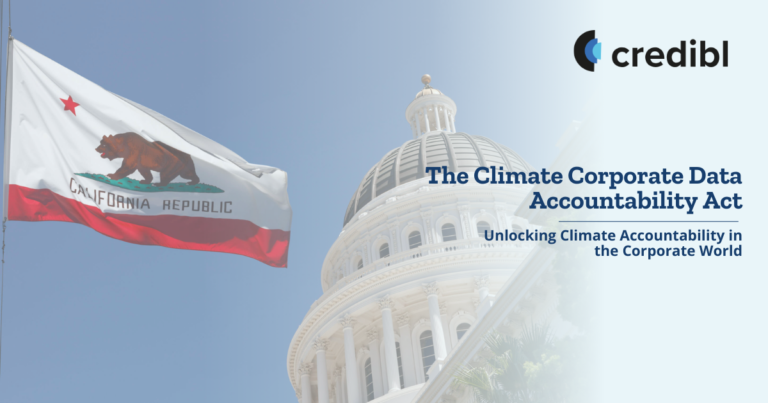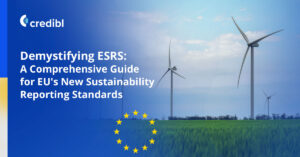Introduction
The Climate Corporate Data Accountability Act (CCDAA) marks a significant stride in California’s journey toward enhanced corporate accountability concerning greenhouse gas emissions. As the global emphasis on climate accountability augments, the CCDAA mirrors this trend within the corporate sectors, placing California at the vanguard of climate reporting in the U.S. This legislation, endorsed by the Assembly and Senate and passed by Governor Gavin Newsom, mandates large enterprises operating in California to transparently disclose their emissions, aligning with the esteemed Greenhouse Gas Protocol.
The Climate Corporate Data Accountability Act (CCDAA)
Recently, the Golden State saw the passage of the CCDAA, a legislative proposal that cleared the Assembly on September 11, 2023, and the Senate a day later, then signed by Governor Gavin Newsom on October 7, 2023. The Act mandates large enterprises operating in California, with annual turnovers surpassing $1 billion, to publicly disclose their greenhouse gas (GHG) emissions. The disclosure compass encompasses Scope 1, 2, and 3 emissions, aligned with the Greenhouse Gas Protocol, mirroring the standard identified in the SEC’s proposed rule on climate change disclosures.
-
Legislative Background
The passage of the CCDAA through California’s Assembly and Senate brings the state a step closer to a more transparent corporate sector concerning climate impacts. As it is cleared by Governor Gavin Newsom, the CCDAA sets the stage for a new chapter in environmental, social, and governance (ESG) disclosures, reflecting the state’s commitment to climate action and corporate accountability.
-
Main Provisions of CCDAA
The CCDAA necessitates large companies in California to disclose their greenhouse gas emissions, a mandate that underscores the state’s resolve to combat climate change. This legislation aligns with the Greenhouse Gas Protocol, ensuring standardized disclosures that not only promote transparency but also allow for a comprehensive understanding of corporate emissions within the state. The disclosure requirements encompass both direct and indirect emissions, thereby providing a holistic view of a company’s carbon footprint.
-
Implications of CCDAA Disclosures
The implications of the CCDAA extend beyond mere emissions reporting; it heralds a new era of standardized and transparent ESG disclosures. By mandating emissions reporting, the CCDAA nudges corporations towards broader ESG disclosures, thereby promoting transparency and corporate accountability. The act resonates with the global trend towards enhanced ESG disclosures as evidenced by a sharp decline in non-disclosure rates among S&P 500 companies from 28% in 2020 to a mere 3% in 2022. Moreover, the CCDAA positions California as a forerunner in climate reporting, setting a precedent that may potentially influence federal legislation on climate disclosure in the U.S.
As corporations strive toward a future of robust ESG disclosures, the CCDAA epitomizes a significant leap toward achieving this objective. The act not only aligns with global disclosure standards but also propels California closer to a sustainable corporate landscape, a transformation much needed in today’s climate-exigent times.
Corporate Accountability
California’s Climate Corporate Data Accountability Act (CCDAA) and the Voluntary Carbon Market Disclosures Act (VCMDA) have set a new bar for corporate accountability in the United States. These landmark legislations require large corporations operating within California to publicly disclose their greenhouse gas emissions and climate-related financial risks, ensuring a level of transparency hitherto unseen in the American corporate landscape.
Under the CCDAA, businesses with annual revenues exceeding $500 million are mandated to disclose their greenhouse gas emissions biennially starting from January 1, 2026. These disclosures must adhere to the framework recommended by the Task Force on Climate-Related Financial Disclosures (TCFD). The California Air Resources Board (CARB) is designated to oversee these disclosures, with a provision for administrative penalties of up to $50,000 for non-compliance in a reporting year.
On the other hand, the VCMDA imposes disclosure requirements on companies making net zero, carbon neutrality claims, or marketing voluntary carbon offsets in California. It mandates transparency on the protocols, projects, and third-party verifications associated with these claims. Non-compliance could result in civil penalties of up to $2,500 per day, capping at $500,00.
These laws not only enhance corporate accountability but also provide a pathway for companies to align their operations with the global goal of reducing carbon emissions and mitigating climate change.
Comparison with Federal and International Measures
The corporate disclosure mandates of California have drawn comparisons with proposed federal regulations and European frameworks. The Securities and Exchange Commission (SEC) has proposed climate disclosure rules that overlap to an extent with California’s legislation. However, experts like Wharton’s Eric Orts believe that California’s broader laws could set a new standard, possibly outliving legal challenges. Moreover, California’s aggressive approach mirrors international trends, especially the EU’s Corporate Sustainability Reporting Directive (CSRD) which seeks to standardize ESG disclosures across member states.
California’s robust climate disclosure requirements reflect a global movement towards mandatory ESG disclosures, aligning with international standards like the Greenhouse Gas Protocol and TCFD framework.
Real-World Impact
The enactment of the Climate Corporate Data Accountability Act (CCDAA) reverberates through the corporate world, heralding a new epoch of transparency and accountability in ESG disclosures. The global terrain has witnessed a burgeoning emphasis on ESG disclosure standards, as evinced by the anticipated regulations in 2023, which are predicted to exponentially amplify the volume of ESG data generated by reporting companies, thereby enlarging the informational landscape accessible to investors.
The real-world ramifications of such disclosures are manifold. ESG investing has mushroomed globally, illustrating a tenfold increase over the last decade. This surge is corroborated by Morningstar, Inc.’s estimation, which places the total assets in ESG-designated funds at an astounding US$3.9 trillion as of September 2021. The ascendancy of ESG investing is mirrored by a remarkable growth in the number of public companies unveiling corporate sustainability reports, which catapulted from less than 20 in the early 1990s to over 10,000 today. Additionally, about 90% of Fortune Global 500 companies have instituted carbon emission targets, a dramatic upsurge from 30% in 2009.
In the United States, the U.S. Securities and Exchange Commission (SEC) is poised to mandate detailed disclosure by companies regarding climate-related risks and opportunities by the close of 2023. This initiative underscores the significance of standardized sustainability reporting, a trend gaining traction worldwide. The SEC’s proposed rules echo the global initiative to measure and disclose greenhouse gas (GHG) emissions in adherence to the GHG Protocol methodology, a widely acknowledged international standard for calculating GHG emissions.
Conclusion
The passage of the Climate Corporate Data Accountability Act (CCDAA) in California is emblematic of a broader global trend toward enhancing corporate accountability and transparency, especially in the realm of environmental sustainability. The CCDAA is poised to catalyze a notable shift in how large corporations report and manage their greenhouse gas emissions, mirroring global strides towards more standardized and thorough ESG disclosures.
Contact us to learn more about the Climate Corporate Data Accountability Act (CCDAA) and its impact on your business.







